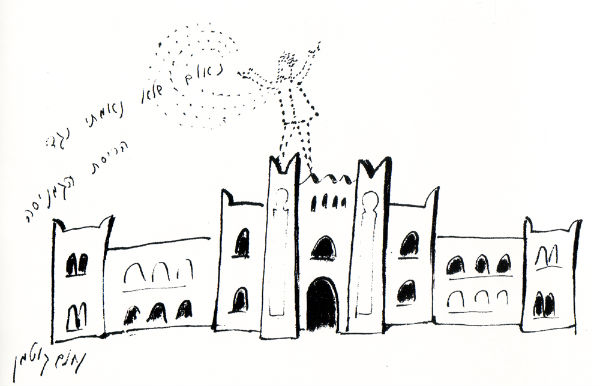It may seem a peculiar time to discuss the gentleness of Israeli culture. Times are brutal. People here are feeling more and more comfortable to express themselves in a vulgar manner. Am I bidding farewell to the kindness in our culture? Peharps.
Then again, even before the head Rabbi of Safed began making openly racist comments in the media and the prime minister described leftists as backstabbers, this was not a culture renowned for its elegance. I tell foreign visitors that the most useful Hebrew word word to learn is “Alllo!” This is what people on the bus yell at the driver when he shuts the back doors before they manage to leap out: “Alllo! Driver! The door!” (composing an actual sentence out of these word would be frowned upon in our staunchly informal society). “Alllo!” is of course also used by the driver himself, as in: “Alllo! lady! make room!”
Cosidering all these Alllos, it’s striking how many exquisite things have been produced here. Take Israeli pop music of the 70s and 80, which was strongly influenced by jazz and by latin American trends such a Bossa Nova. A few days ago I found myself listening to this rendition of “What do the gazelles do at night”. The original poem was authored by Tel-Avivian poet Leah Goldberg and put to some very daring chord progressions by Yoni Rechter, I implore of you to give it a shot.
.
[youtube]http://www.youtube.com/watch?v=PceC1uFvUd0[/youtube]
.
The lyrics are pure magic:
What do the gazelles do at night?
They shut their large eyes tight
they fold their legs so light
they sleep, the gazelles at night…
Goldberg later describes the gazelles’ sweet dream, in which they play marbles with the elephants and win everything. Later she tells how the “gazelle of dawn” (Hebrew term for the morning star), wakes them in the morning. This is just one example of the fantastic poetry Israel’s children grow up listening to. Rechter, the composer, was also involved in a project named “the 16th lamb”, featuring musical interpertations of brilliant childrens’ poetry by Yonatan Geffen.
That was all done in the 70s. In today’s overcommercialized market for childrens’ entertainment, there’s very little that betrays such genious, though good children’s books are written all the time. Today’s IDF soldiers have typically at least heard of the 16th lamb, a deeply humanist work of art. I would hope that it left some mark in them, which a militant minded education can’t entirely remove.
Not only kids thrived on gentleness in previous decades, and not only they do today. My friend Hadas Reshef just sent me this beautiful song, entirely for adults performed by the king of Israeli understatement, Matti Caspi. I was not familiar with it and consider it fantastic.
.
[youtube]http://www.youtube.com/watch?v=KSEfGfDYGDc[/youtube]
.
Matti Caspi is as much a part of our culture as “Alllo!” is. This is what we must nurture.
Now, some who are sensative to ethnic biases may feel that I praise here only distinctly Ashkenazy, or European-inclined, artists. Am I implying that the other trends in Israeli culture are inferior? Am I blaming Mizrachim for “Allllo”? Nothing could be further than the truth. There’s a sophisticated potential in all culture, regardless of its roots. To prove this, let us conclude with Haim’s Moshe’s fantastic “love of my life”.
.
[youtube]http://www.youtube.com/watch?v=kSz2eVvHcmw[/youtube]
.
This song is made of nothing but delicate yearning and allusions to the Song of Songs and medieval Hebrew poetry. It draws from the incredibly rich traditions of Mizrachi “paytanut” cantorship and chanted poetry. Mizrachi music, now a large scale pop industry producing many careless products, could also make an effort to remember its roots. These roots are there, available on Youtube. They too can be a reminder of the kind of culture and society we can and should create here.


